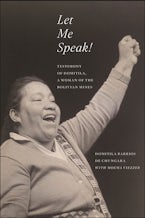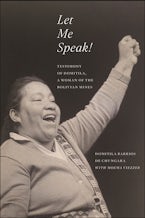A classic recounting of a unionists' struggle against exploitation and dictatorship—from within the mines of Bolivia
Let Me Speak! is the story of a valiant fighter for indigenous and workers’ rights in the mines of Bolivia. First published in English in 1978, Monthly Review Press is now reprinting Let Me Speak! in this new edition, 45 years later.
Written with the assistance of Brazilian sociologist and popular educator Moema Viezzer, this is a lasting classic of the testimonial genre, or the Latin American “testimonio” of one individual in the service of her community and of justice at large. And this testimonial structure impacts the way Chungara and Viezzer choose to share Chungara’s story.
At one point Chungara is jailed and tortured, but escapes. The army, in collusion with her husband’s employers, drive her, terrified children in tow, from their home – but she makes herself a new home. At other points she is a witness to bloody massacres of miners, and brutal government repression of strikes and labor meetings, but she keeps speaking up, as a death warrant hangs over her head.Indefatigable in her conviction and sense of dignity, Chungara first raises her voice alongside 70 other women in the Housewives Committees, and in spite of every effort on the part of the military to intimidate her into submission and silence, her testimonies eventually reach the world stage, echoing in the halls of the U.N. And at that point the mining company endeavors to bribe her out of dire poverty – but, in an act of integrity that is increasingly rare in the times we live in, she balks in the face of their enticements.
What makes this story especially compelling, and lasting, is not that it catalogues the horrors endured by one woman or documents the horrible conditions of life in the Bolivian mining camps at large. What makes it so compelling is that in documenting one woman’s indomitable pursuit of justice, her refusal to submit to harassment, intimidation, and even torture and the threat of death, she offers a document of courage that can inspire generations to come.
As such, more than just a personal account, it also offers important contextualization of the struggles of her time, such as, for example, a sense of the grip of the ideology that underpinned the potency of the mining sector in Bolivia at that time, analysis of US imperialism in its crackdown on communism and leftists in general, and a vision for praxis going forward.
The new edition of Let Me Speak! includes never-before-translated testimonies, resulting in a fuller picture of both Chungara’s worldview, and the time and place in which she arose, the good, the bad and the ugly -- which scholars of Latin American history, women’s history, and oral history/the testimonial genre, will find of interest. This includes a discussion of her role in bringing down the Hugo Banzer dictatorship, and her work as an internationalist during the period of the García Meza dictatorship, from her position of exile in Sweden.
Her account is enduring in its historical significance and continues to be cited in numerous journal articles in every field imaginable, from Sociology, History and Anthropology survey classes, to Latin American studies, Labor studies, Women’s studies. But apart from all that, it is a very compelling and moving read, that feels as vital as it did when first published, even as it gives us a window on a truly remarkable movement of indigenous workers who so deeply believed in joint struggle that they supported each other in resisting corruption.


